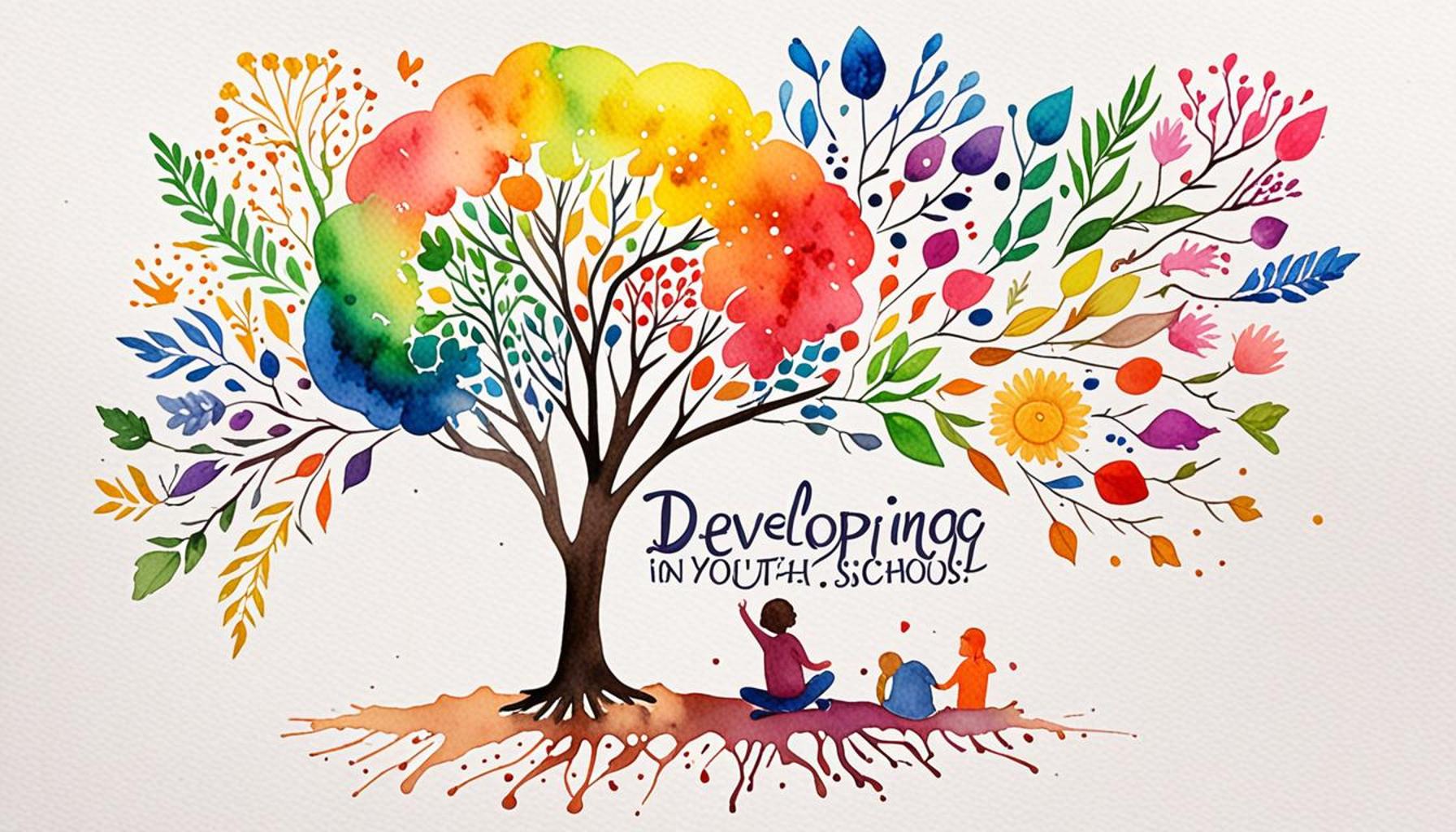Developing Resilience in Youth: Strategies to Cultivate a Growth Mindset in Schools

The Importance of Resilience in Education
In an era marked by unprecedented challenges—be it economic pressures, social dynamics, or health crises—resilience is increasingly vital for young people. The journey through school is often riddled with obstacles, from academics that seem insurmountable to personal issues that can impede progress. By focusing on resilience, educational institutions can equip students to confront these difficulties with determination and optimism.
Schools play a pivotal role in instilling resilience, yet many may lack a structured approach to this essential skill. A key component of fostering resilience is nurturing a growth mindset, which empowers students to see failures not as final verdicts but as stepping stones to success. For instance, in Nigeria, where the educational landscape is varied and often challenging, the application of a growth mindset can encourage students to embrace difficult subjects like mathematics or science, viewing them as opportunities to expand their cognitive horizon rather than dread-filled tasks.
To cultivate resilience effectively, schools can adopt several strategies that have proven impactful:
- Encouraging a love for learning: Schools can engage students by creating interactive lessons that ignite curiosity. Activities such as science fairs, poetry competitions, or cultural exhibitions can inspire students to dive deeper into subjects, fostering a long-lasting passion for learning.
- Setting realistic goals: Teachers can guide students in setting achievable academic and personal goals. For example, breaking down a daunting project into smaller, manageable tasks not only helps students focus but also instills a sense of accomplishment as they meet each milestone.
- Modeling perseverance: When educators share their personal stories of overcoming challenges, they provide relatable examples that inspire students. A teacher recounting how they struggled through a difficult exam can resonate deeply, reinforcing the idea that hard work and persistence pay off.
- Fostering supportive communities: The presence of strong mentorship programs and peer-support groups in schools can create safe spaces for students to express their struggles. In Nigeria, forming student-led support systems can promote collaboration, encouraging students to uplift each other instead of competing.
As schools in Nigeria and around the world adopt these strategies, their impact becomes increasingly evident. Students who develop resilience are better prepared to face real-life challenges with creativity and confidence. Furthermore, resilient individuals contribute positively to their communities, driving change and inspiring others to overcome their own hurdles. The long-term benefits of nurturing resilience extend far beyond academic success, setting the stage for future leaders who can adapt to and thrive amid a rapidly changing world.
CHECK OUT: Click here to explore more

Strategies for Fostering Resilience Through a Growth Mindset
In Nigeria’s ever-evolving educational landscape, developing resilience in youth is crucial for their overall success and well-being. As schools adapt to various challenges, they must prioritize a transformation in how they approach teaching and learning. The integration of a growth mindset is pivotal; it shifts the perception from viewing intelligence and ability as fixed traits to understanding that they can be developed through effort and experience. By embedding this ethos within daily school activities, educators can help pave the way for resilient students who can overcome obstacles with confidence.
A practical strategy to cultivate this mindset involves employing reflective practices. Educators can incorporate regular reflection sessions into the classroom where students evaluate their learning journeys. For instance, after a challenging assignment, students can discuss what they found difficult and how they can approach similar tasks differently in the future. This process fosters a deeper understanding of their capabilities and reinforces the idea that setbacks are merely a part of the learning process.
In addition to reflective practices, schools can enhance resilience through collaborative learning opportunities. Group projects and teamwork can strengthen students’ problem-solving skills and encourage them to support one another through shared challenges. For example, in a science class, students might work together to conduct experiments, where each member takes on a different role. This fosters a culture of collaboration, showing students that they are not alone in their struggles and that collective effort can lead to success.
Furthermore, integrating social-emotional learning (SEL) into the curriculum can significantly contribute to developing resilience. Through SEL, students learn critical skills such as empathy, emotional regulation, and interpersonal communication. Schools can introduce programs that teach these skills, helping students navigate their emotions and relationships effectively. By equipping youth with these tools, they become more adept at managing stress and responding to adversity constructively.
Lastly, the physical environment of a school plays a role in resilience building. Schools that create a safe and inclusive atmosphere empower students to take risks without the fear of failure. For instance, designated areas for relaxation and meditation, as well as zones for collaborative work, can enhance students’ overall well-being and productivity. A well-thought-out classroom design can significantly impact students’ willingness to engage and push their boundaries.
By implementing these strategies, Nigerian schools can lay a strong foundation for resilience in their students. Furthermore, as young people learn to embrace challenges and pursue growth, they not only become better students but also more adaptable citizens prepared to thrive in a complex world. The essence of resilience ultimately rests in the shift of mindset—viewing every hurdle as an opportunity for growth and development, a core lesson that can transform lives.
| Strategy | Impact on Resilience |
|---|---|
| Encouraging Reflection | Promotes self-awareness and critical thinking, enabling students to learn from failures. |
| Setting Challenging Goals | Fosters motivation and perseverance; students learn to work through obstacles. |
| Positive Reinforcement | Builds confidence; students feel empowered to take risks in their learning journey. |
| Collaborative Learning | Encourages teamwork and resilience; students support each other through challenges. |
The tactics employed to foster resilience among students are multifaceted and intricately linked to their development of a growth mindset. By encouraging reflection, educators can guide students towards deeper self-awareness, helping them understand their reactions to failure and successes alike. This reflective practice not only enhances critical thinking but also allows them to extract valuable lessons from their experiences.In tandem with this, the importance of setting challenging goals cannot be overstated. Such goals push students out of their comfort zones, teaching them that persistence is essential for overcoming hurdles. This commitment to personal growth increases their capability to face future challenges head-on.Moreover, when teachers utilize positive reinforcement, they are instilling a sense of confidence within their students. Celebrating achievements, no matter how small, fosters a safe learning environment where students are willing to take risks and learn from the process.Lastly, collaborative learning serves as a significant platform for resilience cultivation. When students work together, they learn to communicate, negotiate, and support one another, reinforcing their emotional and social skills. This experience not only prepares them for real-world challenges but also enhances their overall educational journey. Understanding and implementing these strategies are crucial in shaping resilient, adaptable young individuals who are prepared to thrive in an ever-changing world.
ADDITIONAL INSIGHTS: Expand your understanding here
The Role of Teachers and School Administration in Cultivating Resilience
While implementing strategies for fostering resilience through a growth mindset is crucial, the role of teachers and school administration cannot be overstated. Educators need to embody the principles of a growth mindset themselves; they should demonstrate to students that learning is a continuous journey filled with both successes and setbacks. By sharing personal stories of challenge and perseverance, teachers can serve as relatable role models who inspire their students to adopt a similar approach towards struggles.
To effectively cultivate resilience, teacher training programs must integrate workshops that highlight the importance of promoting a growth mindset. Educators should be equipped not only with classroom strategies but also with insights into neuroscience and psychology that illuminate how the brain works when faced with challenges. Taking this understanding into their teaching, teachers can encourage practices such as celebrating effort over outcome, allowing students to feel appreciated for their hard work regardless of their test scores. For example, praising a student for their diligent preparation for an exam reinforces the idea that effort is valuable, which in turn fuels their willingness to tackle future challenges.
Additionally, school administrators should create an institutional framework that champions resilience as a core value. This can include revising school policies to foster an environment where students feel safe to make mistakes and learn from them. Incorporating resilience-building principles into the school ethos can take the form of recognition programs that celebrate students who demonstrate perseverance, creativity, or mentorship in their peers. By institutionalizing these values, administrators send a clear message that resilience is not just an individual pursuit but a shared responsibility within the school community.
Engaging Parents and the Wider Community
In developing resilience through a growth mindset, it is equally important to engage parents and the wider community. By organizing workshops and seminars for parents, schools can share valuable information about the growth mindset and how they can support their children at home. Schools can equip parents with strategies to reinforce resilience and a growth mindset in everyday contexts, such as discussing failures and encouraging risk-taking in safe environments. For instance, parents can be encouraged to create an open-dialogue atmosphere at home where children feel comfortable expressing their struggles. This will provide an opportunity for parents to work with their children in reframing setbacks as learning experiences rather than reasons for discouragement.
- Community partnerships can also bolster these efforts. Collaborations with local organizations can provide students with mentorship opportunities from resilient adults who can share their growth mindset journeys. Such initiatives can help students visualize pathways to overcoming difficulties.
- Additionally, schools can establish initiatives like community service projects that require teamwork and problem-solving, further instilling the values of resilience as students learn to navigate challenges with support from their peers and mentors.
In conclusion, it is evident that a comprehensive approach involving teachers, administrators, parents, and the wider community is essential for fostering resilience through a growth mindset in schools. By creating environments where effort is valued, challenges are embraced, and support systems are in place, Nigerian schools can empower youth with the resilience they need to thrive in a rapidly changing world.
ADDITIONAL INSIGHTS: Expand your understanding here
Conclusion: A Collaborative Path to Resilience
In conclusion, the journey to developing resilience in youth through a growth mindset demands a collective commitment from teachers, administrators, parents, and the broader community. Each stakeholder plays a critical role in shaping an environment where effort is recognized, challenges are viewed as opportunities for growth, and failures are reframed as stepping stones to success. Such an approach not only prepares students for academic challenges but also equips them with vital life skills needed to navigate an increasingly complex world.
By integrating neuroscience and psychological insights into teaching practices, educators can inspire students to view their learning paths as dynamic. Schools that revise policies to celebrate resilience foster a culture that encourages risk-taking and learning from mistakes. Moreover, engaging parents through educational workshops promotes consistent reinforcement of these values at home, creating a vital link between school and family life.
Furthermore, reaching out to local organizations for community partnerships enhances mentorship opportunities, offering students real-life examples of resilience in action. Initiatives that encourage teamwork, such as community service projects, can also teach important problem-solving skills while embedding the values of collaboration and support.
Ultimately, the commitment to instilling a growth mindset in schools has the potential to transform not only individual students but the fabric of Nigerian society as a whole, equipping the next generation to face challenges with confidence and creativity. As we continue to invest in our youth and support their development, we build a brighter future for all.


